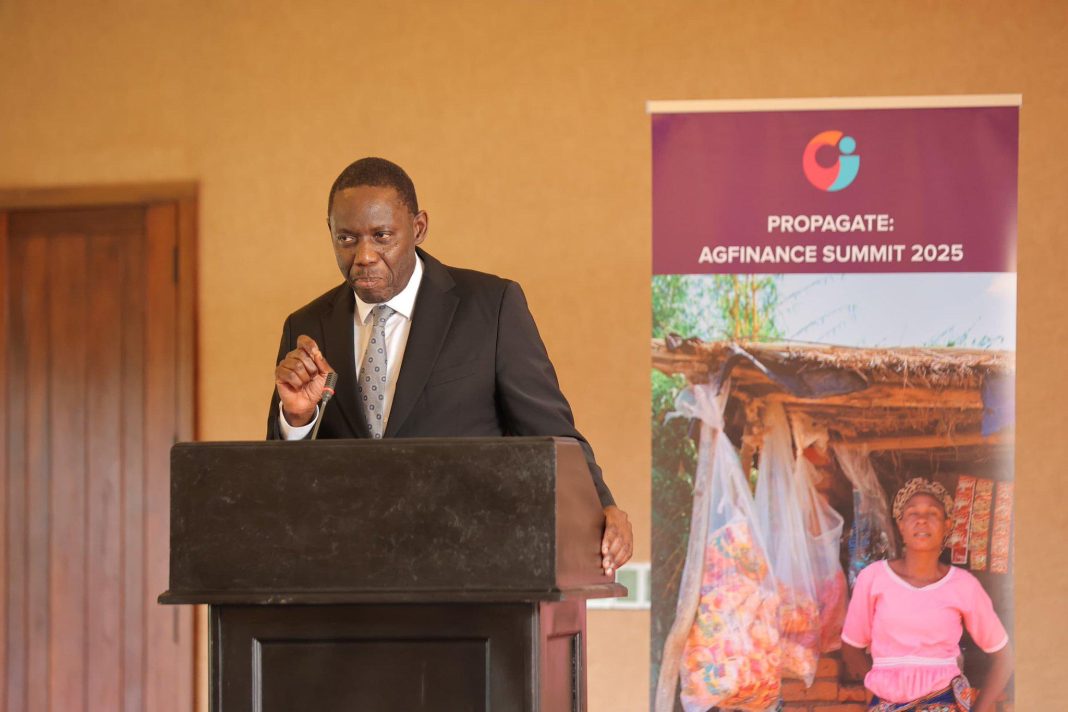By David Mwanje
In a stirring keynote address at Opportunity International’s Agriculture Finance Summit, Michael Atingi-Ego, Governor of the Bank of Uganda, laid out a transformative blueprint to overhaul agricultural finance under the theme “Propagate.” Speaking to a diverse audience of CEOs, innovators, farmers, and development partners, Atingi-Ego framed agriculture as both a casualty of climate change and a cornerstone for economic resilience, urging immediate action to empower smallholder farmers through digital innovation, climate-smart finance, sustainable technologies, and robust market systems.
“Agriculture is not the oldest profession because it is easy it is the oldest because it is the most hopeful act a human being can perform,” Atingi-Ego declared, emphasizing the sector’s critical role in Uganda’s economy, which employs 70% of the workforce and contributes 24% to GDP. He tied this to Uganda’s ambitious Tenfold Growth Strategy, aiming to shift the nation from an agricultural importer to a surplus processor through agro-industrialization.
Central to his vision is addressing the “trust problem” that renders smallholder farmers invisible to formal financial systems. Atingi-Ego championed the creation of a digital financial passport a verifiable record of farmers’ transactions, harvests, and credit histories. He highlighted local fintech pioneer Ensibuuko Technologies, which digitizes savings and lending for rural SACCOs and VSLAs, transforming village cash boxes into data-rich mobile wallets. “This is not a technology problem it’s a trust problem,” he said, stressing that digital inclusion can unlock both capital and human potential, particularly for young women in low-income communities.
To combat climate-induced risks, Atingi-Ego advocated for smarter, blended finance models, pointing to the success of Uganda’s Agricultural Credit Facility (ACF), which boasts a 1% non-performing loan rate three times better than the banking sector average.
He spotlighted micro-insurance as a game changer, citing ACRE Africa’s AI-driven scheme that delivers drought payouts to Ugandan banana growers in under 14 days. “Micro-insurance is no longer a charitable add-on, it delivers a triple dividend: it transfers risk before disaster, sustains investment after disaster, and lowers the cost of capital in ordinary times,” he noted.
Atingi-Ego also emphasized sustainable technologies to boost productivity, such as solar pumps and satellite-based platforms that provide real-time data on weather and soil health. These tools, he argued, make farmers’ yields more predictable and livelihoods more secure, aligning with the Tenfold Growth Strategy’s productivity goals.
Finally, he called for stronger market linkages through warehouse receipts and inclusive contract farming, which have already unlocked UGX 62 billion in credit and empowered 43% of women farmers in Uganda. “That single receipt now collateral, now currency lets farmers wait until prices climb 18 to 35 percent, turning post-harvest glut into household security,” he said. By strengthening cooperatives, these systems transform smallholders into bankable, market-facing enterprises.
Atingi-Ego concluded with a call for collective action, urging delegates to translate rhetoric into measurable outcomes. With private sector credit projected to soar from UGX 26 trillion to UGX 260 trillion by 2040, his vision positions Uganda as a leader in agricultural finance innovation, promising a future where hope yields a bountiful harvest.






















